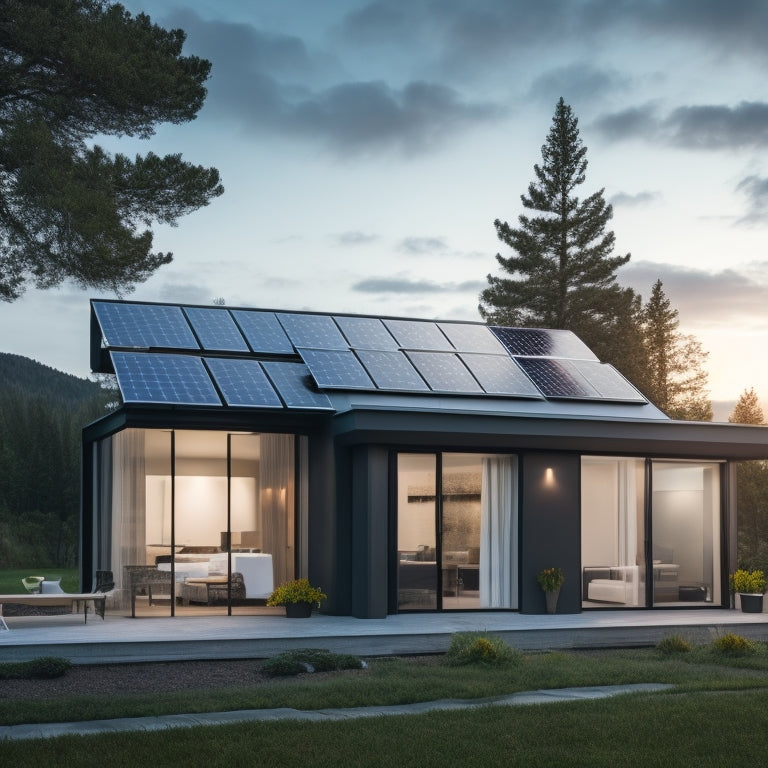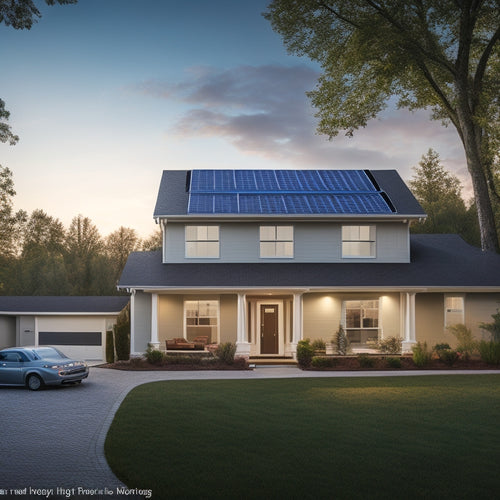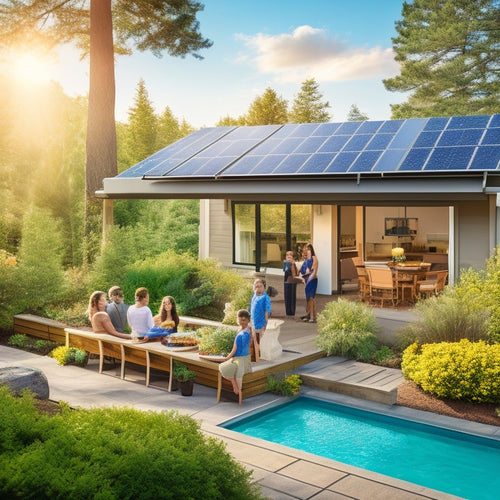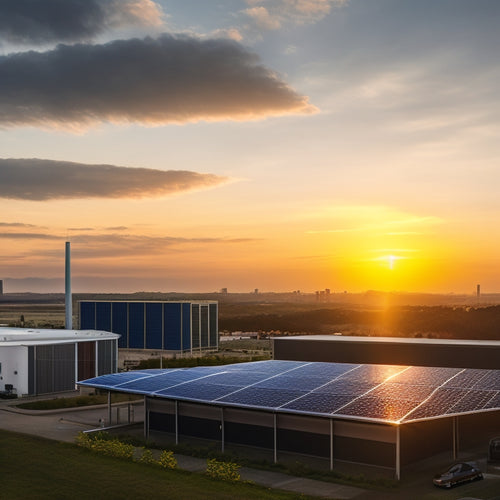
Solar Power Home Battery Backup
Share
By integrating a solar power home battery backup system, you can gain a reliable source of clean energy, even after the sun sets, and reduce your reliance on the grid by up to 90%. This setup allows you to access power at night, minimizing your environmental impact and energy costs. Optimizing your solar panel efficiency and battery charging strategies enables you to maximize energy storage and achieve energy independence. With a seamless shift from solar energy to battery backup, you'll have a reliable electricity supply during outages. As you investigate the world of solar power home battery backup, you'll uncover the complexities of this technology and how it can revolutionize your energy needs.
The Essentials
- Solar power home battery backup systems provide energy independence at night, reducing reliance on the grid and minimizing environmental impact.
- Effective battery charging strategies prioritize excess energy storage, ensuring a reliable electricity supply during outages and nighttime energy independence.
- Solar power home battery backup systems lead to significant reductions in monthly energy bills by storing excess energy for peak hours and optimizing energy storage.
- Deep cycle battery technology is crucial for efficiency, with compatibility, maintenance, and cycle depth limits affecting battery lifespan and overall system performance.
- Lithium-ion batteries offer long cycle life, with proper maintenance practices extending battery life and reducing replacement costs.
Energy Independence at Night
You're no longer tied to the grid's schedule when you have a solar power home battery backup, as you can access power after dark falls.
This means you'll have nighttime energy security, even when the sun isn't shining. With the ability to store excess energy generated by solar panels Renewable Energy Solutions, you can reduce your reliance on the grid and minimize your environmental impact.
With a fully charged battery, you'll be able to power your essential appliances and devices during the night, ensuring your home remains comfortable and safe.
Power After Dark Falls
As the sun dips below the horizon, your solar power system's energy harvesting capabilities come to a halt, leaving you reliant on the grid or backup power sources to meet your energy needs. This marks the beginning of your nighttime energy independence expedition.
To guarantee a seamless shift, it's vital to optimize your solar panel efficiency during the day. By doing so, you'll maximize the energy stored in your batteries, which will be your primary power source after dark.
With a reliable electricity supply from Solar Power Backup systems, you can enjoy uninterrupted power even during extended outages. Effective battery charging strategies play an important role in this process. You can adopt a charging strategy that prioritizes storing excess energy generated during the day in your batteries.
This approach allows you to tap into this stored energy when the sun goes down, reducing your reliance on the grid. By combining high-efficiency solar panels with smart battery charging strategies, you'll be well on your way to achieving energy independence at night.
With a well-designed system, you can enjoy the freedom and security that comes with having a reliable power source, even after dark falls.
Nighttime Energy Security
By nightfall, your solar power system's battery backup takes center stage, providing a reliable source of energy independence. As the sun sets, your solar storage system kicks in, guaranteeing nighttime reliability and energy resilience. This backup system integrates seamlessly with your renewable energy sources, providing a smooth shift from day to night.
With home automation, you can monitor and control your energy management system, adjusting your energy usage to optimize battery performance. Additionally, a reliable battery backup system safeguards your family's comfort and well-being by keeping lights, internet, and communication devices powered on, providing reassurance and stability in times of uncertainty Energy Independence.
Moreover, it prevents costly losses due to food spoilage and damage to electronics by keeping your refrigerator and other essential appliances running during outages.
In the event of a power outage, your solar power home battery backup system springs into action, providing grid independence and uninterrupted energy supply. You're no longer at the mercy of the grid, relying on the utility company to restore power. Instead, you're in control, with a reliable source of energy that's customized to your needs.
Lower Monthly Energy Bills
You'll see a significant reduction in your monthly energy bills with a solar power home battery backup system.
This is because the system guarantees energy savings by storing excess energy generated during the day for use during peak hours, reducing your reliance on the grid.
By leveraging deep cycle batteries and inverter technology, you can optimize your energy storage and reduce waste.
As a result, you'll enjoy lower electricity costs and a more predictable energy budget.
Energy Savings Guaranteed
With a solar power home battery backup system, your monthly energy bills will decrease considerably. You'll enjoy energy savings guaranteed, thanks to the system's ability to optimize energy efficiency and capture free energy from the sun. This means you'll be less reliant on the grid, reducing your energy consumption and subsequent costs.
| Energy Efficiency Benefits | Solar Incentives |
|---|---|
| Reduced Energy Waste: Store excess energy generated during the day for later use, minimizing waste and maximizing savings. | Federal Tax Credit: Claim a tax credit of up to 26% of the total system cost, reducing your tax liability. |
| Optimized Energy Consumption: The system learns your energy usage patterns, optimizing energy consumption and reducing your reliance on the grid. | State and Local Incentives: Take advantage of additional incentives, such as rebates and exemptions, offered by your state and local government. |
| Increased Energy Independence: With a solar power home battery backup system, you'll have control over your energy usage and costs, enjoying increased energy independence. | Net Metering: Sell excess energy back to the grid and receive credit, further offsetting your energy costs. |
Reduced Electricity Costs
Your solar power home battery backup system's energy efficiency benefits have a direct impact on your monthly energy bills. By capturing and storing excess energy generated by your solar panels, you can reduce your reliance on the grid and lower your electricity costs.
This means you'll be paying less to your utility company each month, freeing up more of your hard-earned money for the things that matter most to you.
The cost savings don't stop there. With a solar power home battery backup system, you can also take advantage of time-of-use (TOU) pricing, storing excess energy during off-peak hours and using it during peak hours when rates are highest.
This strategy can lead to significant cost savings over time, especially for homeowners who use most of their energy during the evening or night.
Deep Cycle Battery Tech
You'll want to take into account the battery life expectancy of your deep cycle batteries, as this will impact the overall performance and longevity of your solar power home battery backup system.
When choosing a deep cycle battery, it's crucial to assess the compatibility with your solar energy storage systems and the type of solar inverter you're using.
Cycle depth limits also play a critical role, as they determine how much of the battery's capacity can be safely used without reducing its lifespan.
Battery Life Expectancy
Deep cycle batteries, the backbone of your solar power home battery backup system, are designed to provide reliable energy storage for extended periods.
As you contemplate your battery life expectancy, it's vital to understand the factors that affect its lifespan. You can expect a deep cycle battery to last between 5 to 15 years, depending on usage and maintenance. Proper battery maintenance tips, such as regular charging and discharging, can greatly extend the life of your batteries.
Additionally, operating your batteries within the recommended temperature range and avoiding deep discharges can also contribute to a longer lifespan.
It's also important to reflect on the environmental impact of your battery choice. Look for batteries with a high recyclability rate and made from sustainable materials. By choosing eco-friendly batteries, you can minimize your carbon footprint and reduce waste.
When it's time to replace your batteries, make sure they're disposed of properly to minimize their environmental impact.
Cycle Depth Limits
As you investigate the intricacies of deep cycle battery technology, it's vital to grasp the concept of cycle depth limits, which greatly affect the overall performance and lifespan of your solar power home battery backup system.
Cycle depth limits refer to the maximum depth of discharge (DOD) a battery can handle without compromising its overall health. A deeper cycle depth limit means a battery can provide more power while maintaining its cycle efficiency. However, excessive discharge rates can reduce the battery's lifespan.
You'll need to balance your energy needs with the battery's capacity to guarantee peak performance.
When selecting a deep cycle battery for your solar power home battery backup system, consider the discharge rate and cycle depth limits. A higher discharge rate allows for more power output, but it may reduce the battery's lifespan. Conversely, a lower discharge rate may increase the battery's lifespan but reduce its power output.
Check Your Inverter Compatibility
When selecting a solar power home battery backup system, you'll need to verify the inverter is compatible with your setup, as this is a vital aspect of a successful renewable energy system.
You'll also want to take into account the benefits of energy independence(https://www.illchanterhislater.com) that comes with having a reliable battery backup system.
You'll want to check the inverter type, as some systems require a specific type, such as a hybrid or multi-mode inverter.
Additionally, you'll need to confirm the battery connection types, as some inverters only work with specific connection configurations.
Inverter Type Compatibility
You'll need to verify your solar power home battery backup is compatible with your existing inverter type, as mismatched components can lead to system malfunction or even complete failure. Inverter technology advancements have led to various types of inverters, each with unique characteristics that affect system performance. It's essential to confirm your battery backup is compatible with your inverter type to maximize energy harvesting and storage.
| Inverter Type | Compatibility |
|---|---|
| String Inverter | Compatible with most battery backup systems |
| Microinverter | Requires specialized battery backup systems with microinverter compatibility |
| Power Optimizer | Compatible with select battery backup systems, check specifications |
When selecting a battery backup system, consider the inverter efficiency ratings to guarantee ideal energy storage. Look for systems with high efficiency ratings (>95%) to minimize energy losses. By verifying inverter type compatibility and considering inverter efficiency ratings, you'll secure a seamless integration of your solar power home battery backup system, providing you with reliable energy storage and freedom from grid dependence.
Battery Connection Types
Your solar power home battery backup system's connection type plays a critical role in guaranteeing seamless integration with your existing inverter. The connection type determines how your batteries will interact with the inverter, affecting overall system performance and efficiency.
There are two primary connection types: DC-coupled and AC-coupled systems.
DC-coupled systems connect the batteries directly to the DC input of the inverter, allowing for precise control and optimized battery sizing. This configuration is ideal for new installations, as it enables the inverter to manage the battery's state of charge and optimize energy production.
AC-coupled systems, on the other hand, connect the batteries to the AC output of the inverter, providing more flexibility regarding inverter compatibility. However, this setup may require additional components and can be more complex to install.
When selecting a connection type, consider factors such as inverter compatibility, battery sizing, and system complexity to guarantee a reliable and efficient solar power home battery backup system.
Lithium-Ion Long Cycle Life
You'll want to prioritize lithium-ion batteries with a long cycle life when selecting a solar power home battery backup.
These batteries can last for 5,000 to 7,000 charge cycles or more, which translates to a longer battery lifespan.
With a longer lifespan, you'll need to replace your batteries less frequently, reducing overall maintenance costs.
Longer Battery Lifespan
With the increasing adoption of solar power systems, the focus has shifted towards optimizing their performance, particularly when it comes to battery backup. As you invest in a solar power home battery backup, you want to guarantee you get the most out of your system. A longer battery lifespan is vital in achieving this goal.
You can extend the life of your lithium-ion batteries by following proper battery maintenance tips. For instance, you should avoid deep discharging your batteries, as this can reduce their overall lifespan. Instead, try to keep your batteries charged between 20% and 80% if possible.
Additionally, storing your batteries in a cool, dry place can help prolong their lifespan. Optimal charging techniques are also important in maximizing your battery's lifespan. Avoid overcharging your batteries, as this can cause damage to the cells.
You should also monitor your battery's state of charge and adjust your charging schedule accordingly. By following these tips, you can enjoy a longer battery lifespan and get the most out of your solar power home battery backup system.
Frequently Asked Questions
Can I Use Solar Power Home Battery Backup With a Generator?
You're wondering if you can use a generator with your home battery backup system; yes, you can, but guarantee generator compatibility and proper battery integration to avoid conflicts and optimize energy harvesting, storage, and backup functionality.
How Do I Maintain My Home Battery Backup System?
Just like a well-tuned orchestra, your battery backup system requires harmony between its components. You'll extend its battery lifespan by following essential maintenance tips: monitoring temperature, updating software, and performing regular capacity tests to guarantee your system's ensemble of energy independence.
Will My Appliances Work During a Power Outage?
During an outage, you'll want to know if your appliances will keep running. Fortunately, your backup system's capacity determines which appliances will work, so it's crucial to check appliance compatibility to guarantee your must-haves stay on.
Can I Add More Batteries to My Existing System Later?
Like a puzzle, your energy independence is built piece by piece; you can add more batteries to your existing system later, as long as you guarantee system compatibility, making battery expansion a seamless and liberating process.
Is a Home Battery Backup System Covered by a Warranty?
When you invest in a home battery backup system, you'll typically find it's covered by a warranty with a specific duration, outlining coverage limitations, so you're protected from defects and malfunctions, giving you peace of mind and freedom from worry.
Final Thoughts
As you flip the switch, your solar power home battery backup springs to life, illuminating your evening like a lighthouse of energy independence. With lower monthly energy bills, you're free to enjoy the comforts of home without the weight of rising costs. Like a quiet guardian, your deep cycle battery stands ready, its lithium-ion heart beating steadily through the night, powering your home with a reliability that's music to your ears.
Related Posts
-

Cost of Solar With Battery Backup
You're investing in a solar panel system with battery backup to guarantee reliable power during outages. The cost of ...
-

Top-Rated Home Solar Power Kits for Achieving Energy Independence
Top-rated home solar power kits enable you to achieve energy independence by greatly cutting your energy costs. You c...
-

Advantages of Commercial Solar Battery On-Site Storage
By investing in a commercial solar battery on-site storage system, you can greatly reduce your energy grid dependence...


